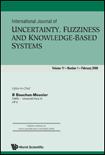
INTERNATIONAL JOURNAL OF UNCERTAINTY FUZZINESS AND KNOWLEDGE-BASED SYSTEMS
Scope & Guideline
Empowering research through the lens of uncertainty and fuzziness.
Introduction
Aims and Scopes
- Fuzzy Logic and Systems:
Explores the application of fuzzy logic to model uncertainty and imprecision in various systems, ranging from control systems to decision-making frameworks. - Uncertainty Modeling:
Investigates different approaches to model uncertainty, including probabilistic methods, interval analysis, and fuzzy set theory, particularly in complex systems. - Knowledge Representation and Reasoning:
Focuses on methods for representing knowledge in uncertain environments and reasoning under uncertainty, utilizing techniques from artificial intelligence and machine learning. - Applications in Real-World Problems:
Applies theoretical concepts of fuzziness and uncertainty to solve practical issues in fields such as economics, engineering, healthcare, and social sciences. - Optimization Techniques:
Develops and analyzes optimization methods that accommodate uncertainty and vagueness, particularly in multi-criteria decision-making scenarios. - Data Science and Machine Learning:
Integrates fuzzy systems and uncertainty modeling with machine learning techniques to enhance data analysis, classification, and prediction.
Trending and Emerging
- Deep Learning and Fuzzy Systems:
There is a growing trend in integrating deep learning techniques with fuzzy systems, focusing on improving classification, prediction, and feature extraction in complex datasets. - Multi-Criteria Decision Making (MCDM):
Emerging research is increasingly centered on advanced MCDM methodologies that incorporate fuzzy logic to handle uncertainty in decision processes, particularly in economics and resource management. - Adaptive and Intelligent Systems:
A significant trend is the development of adaptive systems that utilize fuzzy logic and uncertainty modeling to respond dynamically to changing environments and data inputs. - Applications in Health and Social Sciences:
Research applications in healthcare, particularly using fuzzy logic for diagnosis and treatment optimization, as well as social sciences, are gaining traction, reflecting the need for nuanced approaches in these fields. - Hybrid Algorithms and Optimization:
The journal is witnessing an increase in studies focused on hybrid algorithms that combine fuzzy logic, genetic algorithms, and other optimization techniques to solve complex problems.
Declining or Waning
- Classical Statistical Methods:
There has been a decline in publications focusing on classical statistical approaches, as newer methodologies incorporating machine learning and fuzzy logic gain prominence. - Basic Fuzzy Set Theory:
Research centered solely on foundational fuzzy set theory appears to be waning, with fewer studies exploring its basic concepts without integration into broader applications or complex systems. - Single-Domain Applications:
The journal has seen a reduction in papers that focus exclusively on single-domain applications of fuzzy logic or uncertainty, shifting towards interdisciplinary approaches that combine multiple fields. - Traditional Decision-Making Models:
There is a noticeable decrease in the exploration of traditional decision-making models without the incorporation of fuzzy or uncertain elements, as researchers seek more robust frameworks. - Static Knowledge Representation:
Research on static models of knowledge representation is diminishing, with a trend toward dynamic and adaptive systems that can better handle real-time data and uncertainty.
Similar Journals
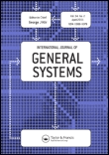
INTERNATIONAL JOURNAL OF GENERAL SYSTEMS
Innovating Research on General Systems since 1974The INTERNATIONAL JOURNAL OF GENERAL SYSTEMS, published by TAYLOR & FRANCIS LTD, is a prestigious peer-reviewed journal dedicated to advancing the fields of systems theory and its applications across a variety of scientific disciplines. With an ISSN of 0308-1079 and an E-ISSN of 1563-5104, this journal has carved a niche since its inception in 1974, continuing to provide a platform for innovative research through to 2024. Featured in the esteemed Q2 category in multiple domains, including Computer Science Applications, Control and Systems Engineering, and Information Systems, it serves as a vital resource for the scientific community, fostering interdisciplinary collaboration. The journal's rankings in Scopus reflect its quality, with noteworthy positions in fields such as Mathematics, Engineering, and Theoretical Computer Science. While access is through subscription, the journal remains an essential conduit for researchers, professionals, and students eager to deepen their understanding of general systems and their complex interactions within various environments.
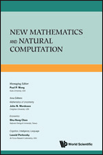
New Mathematics and Natural Computation
Catalyzing Interdisciplinary Dialogue in Mathematics and ComputingNew Mathematics and Natural Computation, published by World Scientific Publishing Co Pte Ltd, is a pivotal journal in the realms of applied mathematics and computational theories, catering to a diverse audience of researchers, professionals, and students. With an ISSN of 1793-0057 and E-ISSN 1793-7027, this journal serves as a critical platform for disseminating innovative research and methods that intertwine mathematical theories with natural computation processes. Operating from Singapore, it emphasizes accessibility and collaboration in advancing interdisciplinary knowledge, despite its current Q4 rankings across relevant categories such as Applied Mathematics and Human-Computer Interaction—highlighting the journal’s commitment to growth and improvement in a competitive publishing landscape. As a source of insightful findings and applications in mathematics and computer science, it invites contributors to explore the dynamic intersections between these fields and foster academic dialogue. Researchers aiming to engage with cutting-edge advancements will find this journal instrumental for their work from its inaugural issue in 2012 through its projected publications into 2024.

International Journal of Fuzzy Systems
Pioneering Research at the Intersection of Theory and PracticeThe International Journal of Fuzzy Systems, published by SPRINGER HEIDELBERG, is a premier platform for disseminating cutting-edge research in the fields of Artificial Intelligence, Control and Systems Engineering, Computational Theory and Mathematics, and more. With an impressive impact factor reflected in its Q2 category rankings across various domains, this journal serves as a vital resource for researchers, professionals, and students eager to explore the applications of fuzzy logic in solving complex real-world problems. Established in 2004, the journal continues to contribute significantly to theoretical advancements and practical implementations in areas such as information systems and software engineering. The journal does not offer Open Access, ensuring a curated audience of engaged readers and contributors. Its rigorous peer-review process guarantees high-quality publications that resonate within the scientific community. For those interested in the intersection of theoretical insights and practical applications, the International Journal of Fuzzy Systems stands out as an essential venue for knowledge exchange and innovation.

Fuzzy Optimization and Decision Making
Exploring the Intersection of Logic, Software, and OptimizationFuzzy Optimization and Decision Making, published by Springer, is a prestigious academic journal that has made significant contributions to the fields of Artificial Intelligence, Logic, and Software. With an impressive impact factor and a consistent ranking in the top Q1 quartile across its categories, this journal stands at the forefront of research dissemination in its domain. Established in 2002 and continuing through 2024, the journal focuses on the theoretical and practical aspects of fuzzy optimization methods and their applications in decision-making scenarios. The journal is highly regarded for its rigorous peer-review process and aims to present innovative research findings that inspire advancements in optimization techniques using fuzzy logic. Aimed at researchers, professionals, and students alike, Fuzzy Optimization and Decision Making serves as an essential resource for those looking to stay at the cutting edge of technology and methodology in mathematics and computer science.
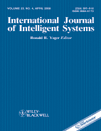
INTERNATIONAL JOURNAL OF INTELLIGENT SYSTEMS
Connecting Researchers to Cutting-Edge AI DevelopmentsInternational Journal of Intelligent Systems, published by Wiley-Hindawi, stands at the forefront of the Artificial Intelligence, Human-Computer Interaction, Software, and Theoretical Computer Science fields. With an impressive Q1 ranking across multiple categories in 2023 and a robust track record since its inception in 1986, this journal is essential for researchers, professionals, and students alike who are eager to explore cutting-edge innovations and theoretical advancements. Located in the United Kingdom, the journal operates under the esteemed Wiley-Hindawi publishing house, ensuring a broad dissemination of high-quality research articles. The journal's diverse scope encompasses advancements in intelligent systems and their practical applications, fostering an interdisciplinary dialogue that encourages collaboration across various domains. Although Open Access options are not available, subscribers benefit from the rich repository of knowledge this journal offers, making it a vital resource in the rapidly evolving landscape of intelligent technologies.
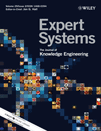
EXPERT SYSTEMS
Empowering Minds through Cutting-Edge Computational Research.EXPERT SYSTEMS is a prestigious journal published by WILEY, dedicated to advancing the fields of Artificial Intelligence, Computational Theory and Mathematics, Control and Systems Engineering, and Theoretical Computer Science. Established in 1984, this journal has consistently provided a platform for rigorous research, showcasing innovative methodologies and applications that drive the future of intelligent systems. With an impressive impact factor and Scopus rankings placing it among the top quartiles within its categories, EXPERT SYSTEMS is a vital resource for researchers, professionals, and students seeking to deepen their understanding of complex systems and their applications. The journal is not currently an Open Access publication, emphasizing its commitment to high-quality, peer-reviewed research that impacts the global academic community. With a convergence year extending to 2024, it prepares to continue its legacy as a cornerstone of knowledge in these dynamic fields.

CYBERNETICS AND SYSTEMS ANALYSIS
Bridging Knowledge Gaps in Cybernetics and Systems ScienceCYBERNETICS AND SYSTEMS ANALYSIS is a distinguished journal published by Springer, focusing on innovative research and developments in the fields of cybernetics, systems analysis, and their applications within computer science. With an ISSN of 1060-0396 and E-ISSN of 1573-8337, this journal serves as a critical platform for disseminating groundbreaking ideas that drive advancements in computational theories and practices. Although it operates under a subscription model, the journal is highly regarded with a Q3 ranking in computer science, as of 2023, highlighting its relevance in the academic community. Covering a broad scope from the convergence years of 1991–2001 and 2003, and extending its reach from 2005 through 2024, CYBERNETICS AND SYSTEMS ANALYSIS plays a pivotal role in fostering dialogue and collaboration among researchers, professionals, and students, aiming to merge theory with practical applications in cybernetics and systems thinking.

Fuzzy Information and Engineering
Transforming Knowledge into Impactful Research in EngineeringFuzzy Information and Engineering is a prestigious open access journal recognized for its contributions to the interdisciplinary fields of applied mathematics, control systems engineering, artificial intelligence, and information systems, published by TSINGHUA UNIVERSITY PRESS. With an impact factor that reflects its increasing influence, the journal has maintained a strong position in the academic community since its inception in 2011, converging its focus between 2014 and 2024. The journal is indexed in notable databases such as Scopus, demonstrating solid rankings across its categories, including a commendable Q3 classification in applied mathematics and control systems engineering. By fostering innovative research and disseminating key findings, Fuzzy Information and Engineering serves as a vital platform for researchers, professionals, and students alike, promoting advancements in fuzzy systems and their applications within diverse domains. Notably, since transitioning to an open access model in 2015, the journal has enhanced accessibility for a global audience, encouraging collaborative efforts in academia and industry.
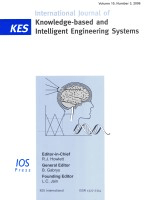
International Journal of Knowledge-Based and Intelligent Engineering Systems
Connecting Minds to Shape the Future of Intelligent SystemsThe International Journal of Knowledge-Based and Intelligent Engineering Systems, published by IOS PRESS, serves as a vital platform for scholars and practitioners involved in the fields of Artificial Intelligence, Control and Systems Engineering, and Software Development. Founded in 2004 and continuously publishing through to 2024, this journal stands out with its comprehensive coverage of innovative methodologies and applications that leverage knowledge-based systems. Although currently listed in Q4 for Artificial Intelligence and Q3 for Control and Systems Engineering, it features an increasing trajectory in the scientific community, as indicated by its rankings in Scopus—which reflects the growing importance of intelligent engineering systems in contemporary research. With a commitment to disseminating cutting-edge research without open access constraints, this journal is essential for those seeking to understand and contribute to advancements in intelligent systems. Join a global community of researchers and industry leaders by engaging with the latest findings shared in this well-regarded journal.

INFORMATICA
Fostering interdisciplinary collaboration for a brighter academic future.INFORMATICA, ISSN: 0868-4952, E-ISSN: 1822-8844, is a prestigious academic journal published by the Institute of Mathematics and Informatics, located in the Netherlands. Established in 1990, this journal has carved a significant niche in the fields of Applied Mathematics and Information Systems, holding a commendable Q2 ranking in both categories as of 2023. With a Scopus ranking of #68 in Applied Mathematics and #123 in Information Systems, INFORMATICA boasts an impressive percentile standing, demonstrating its high impact and relevance in contemporary research. The journal promotes rigorous scholarship, disseminating innovative research findings and methodologies that contribute to the advancement of mathematical and informatics theories and practices. Although it does not currently operate as an open-access journal, it provides invaluable resources for researchers, professionals, and students looking to deepen their expertise and knowledge in these dynamic fields. With a commitment to fostering academic exchange and interdisciplinary collaboration, INFORMATICA remains an essential platform for those committed to pushing the boundaries of knowledge in mathematics and informatics.